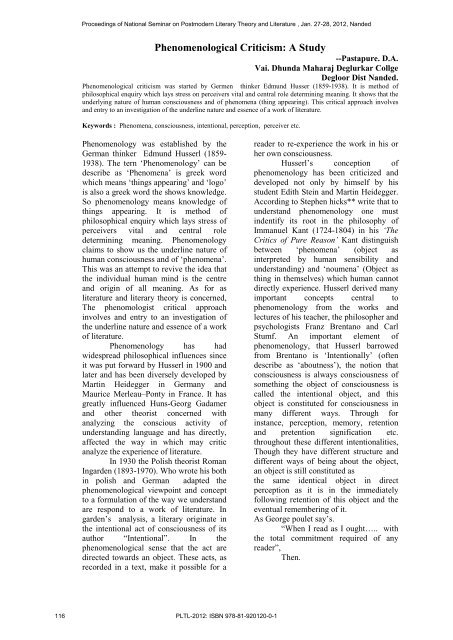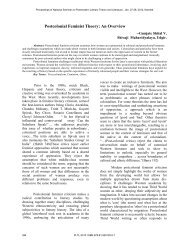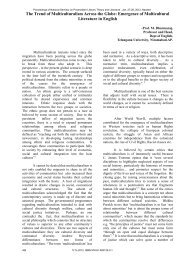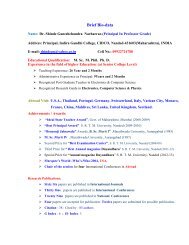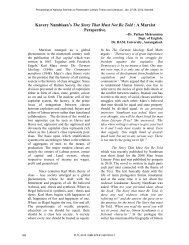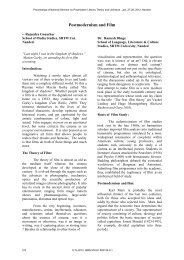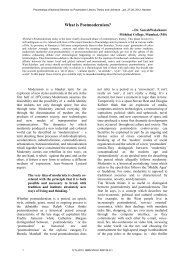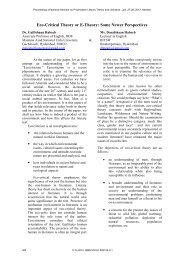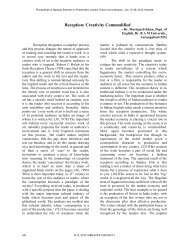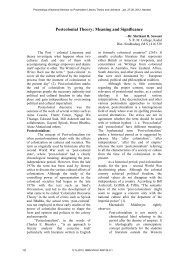Post-Structuralism: An Indian Preview - Igcollege.org
Post-Structuralism: An Indian Preview - Igcollege.org
Post-Structuralism: An Indian Preview - Igcollege.org
You also want an ePaper? Increase the reach of your titles
YUMPU automatically turns print PDFs into web optimized ePapers that Google loves.
Proceedings of National Seminar on <strong>Post</strong>modern Literary Theory and Literature , Jan. 27-28, 2012, Nanded<br />
Phenomenological Criticism: A Study<br />
--Pastapure. D.A.<br />
Vai. Dhunda Maharaj Deglurkar Collge<br />
Degloor Dist Nanded.<br />
Phenomenological criticism was started by Germen thinker Edmund Husser (1859-1938). It is method of<br />
philosophical enquiry which lays stress on perceivers vital and central role determining meaning. It shows that the<br />
underlying nature of human consciousness and of phenomena (thing appearing). This critical approach involves<br />
and entry to an investigation of the underline nature and essence of a work of literature.<br />
Keywords : Phenomena, consciousness, intentional, perception, perceiver etc.<br />
Phenomenology was established by the<br />
German thinker Edmund Husserl (1859-<br />
1938). The tern ‘Phenomenology’ can be<br />
describe as ‘Phenomena’ is greek word<br />
which means ‘things appearing’ and ‘logo’<br />
is also a greek word the shows knowledge.<br />
So phenomenology means knowledge of<br />
things appearing. It is method of<br />
philosophical enquiry which lays stress of<br />
perceivers vital and central role<br />
determining meaning. Phenomenology<br />
claims to show us the underline nature of<br />
human consciousness and of ‘phenomena’.<br />
This was an attempt to revive the idea that<br />
the individual human mind is the centre<br />
and origin of all meaning. As for as<br />
literature and literary theory is concerned,<br />
The phenomologist critical approach<br />
involves and entry to an investigation of<br />
the underline nature and essence of a work<br />
of literature.<br />
Phenomenology has had<br />
widespread philosophical influences since<br />
it was put forward by Husserl in 1900 and<br />
later and has been diversely developed by<br />
Martin Heidegger in Germany and<br />
Maurice Merleau–Ponty in France. It has<br />
greatly influenced Huns-Ge<strong>org</strong> Gadamer<br />
and other theorist concerned with<br />
analyzing the conscious activity of<br />
understanding language and has directly,<br />
affected the way in which may critic<br />
analyze the experience of literature.<br />
In 1930 the Polish theorist Roman<br />
Ingarden (1893-1970). Who wrote his both<br />
in polish and German adapted the<br />
phenomenological viewpoint and concept<br />
to a formulation of the way we understand<br />
are respond to a work of literature. In<br />
garden’s analysis, a literary originate in<br />
the intentional act of consciousness of its<br />
author “Intentional”. In the<br />
phenomenological sense that the act are<br />
directed towards an object. These acts, as<br />
recorded in a text, make it possible for a<br />
reader to re-experience the work in his or<br />
her own consciousness.<br />
Husserl’s conception of<br />
phenomenology has been criticized and<br />
developed not only by himself by his<br />
student Edith Stein and Martin Heidegger.<br />
According to Stephen hicks** write that to<br />
understand phenomenology one must<br />
indentify its root in the philosophy of<br />
Immanuel Kant (1724-1804) in his ‘The<br />
Critics of Pure Reason’ Kant distinguish<br />
between ‘phenomena’ (object as<br />
interpreted by human sensibility and<br />
understanding) and ‘noumena’ (Object as<br />
thing in themselves) which human cannot<br />
directly experience. Husserl derived many<br />
important concepts central to<br />
phenomenology from the works and<br />
lectures of his teacher, the philosopher and<br />
psychologists Franz Brentano and Carl<br />
Stumf. <strong>An</strong> important element of<br />
phenomenology, that Husserl barrowed<br />
from Brentano is ‘Intentionally’ (often<br />
describe as ‘aboutness’), the notion that<br />
consciousness is always consciousness of<br />
something the object of consciousness is<br />
called the intentional object, and this<br />
object is constituted for consciousness in<br />
many different ways. Through for<br />
instance, perception, memory, retention<br />
and pretention signification etc.<br />
throughout these different intentionalities,<br />
Though they have different structure and<br />
different ways of being about the object,<br />
an object is still constituted as<br />
the same identical object in direct<br />
perception as it is in the immediately<br />
following retention of this object and the<br />
eventual remembering of it.<br />
As Ge<strong>org</strong>e poulet say’s.<br />
“When I read as I ought….. with<br />
the total commitment required of any<br />
reader”,<br />
Then.<br />
116 PLTL-2012: ISBN 978-81-920120-0-1


